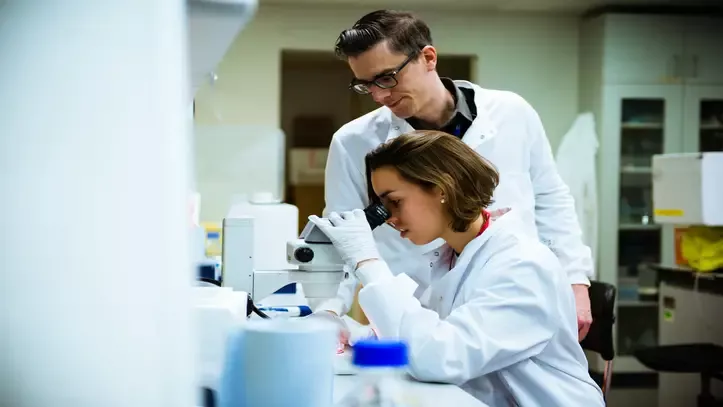We’re thrilled to unveil the latest research funded by the Type 1 Diabetes Grand Challenge – a ground-breaking partnership between us, Diabetes UK and JDRF, following our momentous £50 million pledge into finding a cure for type 1 diabetes.
Earlier this year, we called on scientists to submit research proposals to get us closer to having new treatments for people with type 1 diabetes that tackle the root cause of their condition and restore their insulin-making beta cells.
Now, over £13 million of funding will support six outstanding research teams – made up of 40 scientists, working at 18 different institutions in the UK and Europe – to fast-track discoveries that could see us make huge strides in how we treat type 1 diabetes.
The Type 1 Diabetes Grand Challenge’s latest awards focus on two key research areas:
- Improving methods to grow and transplant insulin-producing beta cells into people with type 1 diabetes.
- Understanding how to stop the immune system attack at the root of type 1 diabetes.
Helping people make their own insulin
Professor David Hodson, at the University of Oxford, will lead to team to explore how insulin-boosting molecules, which sit on the surface of beta cells, could be harnessed to create better performing lab-grown beta cells. They will also test if the specialised molecules could help to protect transplanted beta cells from the immune system, or trigger new beta cells to grow inside the pancreas.
Working to create an unlimited supply of elite lab-made beta cells that can deftly respond to changing blood sugar levels will be the mission of the team led by Professor Shanta Persaud and Dr Aileen King, at King’s College London. They will utilise their expertise in human beta cell development to innovate improved methods of turning stem cells into beta cells and ensure they are well equipped to survive transplantation.
Professor Francesca Spagnoli, at King’s College London, will spearhead a multi-disciplinary team who will concentrate on keeping transplanted lab-made beta cells safe from harm. This will include developing a device that beta cells can live inside to protect them from the hostile environment they will face once inside the body.
Searching for ways to help more people benefit from islet transplants will be the focus of Professor Shareen Forbes, at the University of Edinburgh, and her team. Islet transplants involving taking clusters of cells from a donor pancreas and injecting them into the liver of someone with type 1 diabetes. The team will investigate if delivering drugs packaged inside micro-capsules alongside islet transplants could help donated cells produce more insulin and survive for longer.
Stopping the immune attack’s harm
A team led by Dr James Pearson, at Cardiff University, have been awarded funding to investigate how the time of day could impact the effectiveness of an immunotherapy, named Interleukin-2 (IL-2). They will study how cells, which help to shield beta cells from the type 1 diabetes immune attack, respond to IL-2 throughout the day to find the best time to give it to stop type 1 diabetes in its tracks.
Dr Danijela Tatovic, at Cardiff University, will head up a team to explore if combining multiple immunotherapies could make them more effective at protecting beta cells and slowing the progression of type 1 diabetes. Her team will run a clinical trial testing two promising immunotherapies, abatacept and IL-2, in people recently diagnosed with type 1 diabetes to understand how best to combine the treatments.
Summaries of each of these incredible projects can be found here.
Steve and Sally Morgan, Founders of the Steve Morgan Foundation, said:
“This is an exciting moment in our partnership with Diabetes UK and JDRF UK. We are astounded by the innovation and vision of the new projects and look forward to seeing how the research helps us realise our ambition of transforming the lives of people with type 1 diabetes.”
Dr Elizabeth Robertson, Director of Research at Diabetes UK, said:
“We’re in a hugely exciting period for the Type 1 Diabetes Grand Challenge, as today we welcome six exceptional scientists who will lead exciting multi-disciplinary teams to drive forward this pioneering initiative and build momentum towards our ambitious goal.
“This announcement brings with it fresh hope of a cure for everyone living with type 1 diabetes, and we look forward to seeing how these projects will break new ground in our search for life-changing beta cell therapies and treatments to overcome the type 1 immune system attack.”
Rachel Connor, Director of Research Partnerships at JDRF UK, said:
“Today’s announcement of six newly funded research projects demonstrates the speed and ambition of the Type 1 Diabetes Grand Challenge. All six projects hold great promise for people with type 1 diabetes. We can’t wait to see the results of this vital research to transform beta cell therapy and tackle the immune reaction that is at the root of driving type 1.”
Our latest awards take the total amount of funding the Type 1 Diabetes Grand Challenge has awarded in 2023 to over £20 million. We’ll keep you updated on the progress of this extraordinary research as our growing squad of scientists help us step closer to a cure.

